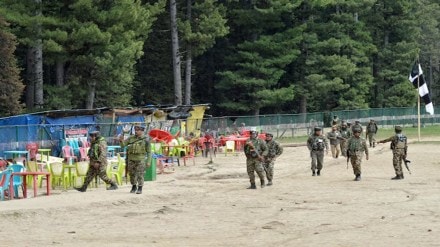This has been a hard piece to write. Every time I sat down to write the first sentence, images of horror from that sunny, mountainous meadow distracted me. Images of the bodies of young men, images of women weeping for dead male relatives, images of terrified children. Of all these images, the one that has become deeply etched in my head is that of the desolate young bride sitting beside the body of the Naval officer she married just days before coming to Pahalgam. What kind of men can deprive a newly married couple of happiness? What kind of men can kill husbands in front of their wives, fathers before children simply because they do not like their religion? Only one kind. Those so filled with hatred that their victims stop being human in their eyes.
As someone who knows Pakistan well, believe me when I tell you that every Pakistani child is brought up on hatred of Hindus and India. The reason they are taught in their school textbooks to hate India is supposedly Kashmir. And the truth is that I have never met a Pakistani, either in the drawing rooms of Lahore and Karachi, or in the streets of these cities who did not bring up Kashmir as the main reason for his hatred of India. Some have come to India and been bedazzled but the only thing that changes is that they say that if the ‘Kashmir problem’ was solved there would be peace with India. Their solution is that India hand Kashmir over to Pakistan. When I have dug deeper, I have found that Kashmir is only part of the problem. The real problem is that they want to think of themselves as Arabs and Persians, and not Indians. That is how deep the hatred goes.
The Pakistani Army Chief is the first high-level Pakistani official who has articulated that deeper reason so clearly. Days before the massacre in Pahalgam, General Asim Munir addressed a group of overseas Pakistanis in Islamabad. He told them that it was their duty to tell their children ‘The story of Pakistan’. Tell them, he said, how we fought and sacrificed to create this country because we knew that we could not live with Hindus. They are different in every way to us, he said, their culture is different, their religion is different, they have different goals and ambitions. It was only at the end of this speech, that he reminded his audience that ‘Kashmir is Pakistan’s jugular vein’.
Were the murderous fanatics who came to Pahalgam inspired by this speech? Possibly. What is clear as daylight is that they were the spawn of the Pakistani Army. After losing more than one war, the military men and mad mullahs who are the real rulers of Pakistan appear to have concluded that the only way to fight India is through jihadist terrorism. This time, as they did in Mumbai on November 26, 2008, they went too far because they killed civilians and not soldiers or paramilitaries. There is not an Indian I have spoken to in the past week who does not now want war.
The Prime Minister, when he spoke about Pahalgam in his speech at a public rally in Bihar last week, did not mention Pakistan. He talked only of tracking and punishing ‘terrorists and their backers’, and perhaps this was for strategic reasons. But the decision to suspend the Indus Water Treaty and to close the border suggests that he knows exactly who is to blame for what happened. Most Indians know that Pakistan is nearly always behind acts of jihadi terrorism in India and most Indians would like to see India do what Israel does when it is attacked.
Jihadi terrorism is the most hideous kind of terrorism because the violence is totally inspired by religion. If Pakistan has become a country in which the worst kind of violent jihadis find shelter and support, it is because the groundwork for hating idol worshippers like us is done in school, before children know the meaning of religion. Inevitable, since the only reason why Pakistan exists is because its founding fathers believed that it was simply not possible for Muslims to live along with us proud infidels.
So, what happens next? It is hard to say. There has already been some shooting on the Line of Control and the homes of at least two suspected Kashmiri terrorists have been destroyed by our security forces. The good news from the Kashmir Valley is that local Kashmiris who have in the past given succor and refuge to the jihadi groups seem now to have come out against them. Unsurprising really, since in the five years that have followed the abrogation of Article 370, the Valley has seen peace and prosperity of the kind that existed before the insurgency began in the 1980s.
If the Prime Minister declares war on Pakistan, he will have the whole country behind him. If he does nothing, he will lose everyone’s support because most Indians feel that our leaders have too often in the past done nothing after a jihadist attack from Pakistan. I count myself among them and have no hesitation in admitting that I was ashamed that our Prime Minister did nothing other than send Pakistan’s generals dossiers of proof after the 26/11 attack. This was taken as a sign of India’s weakness not strength.
